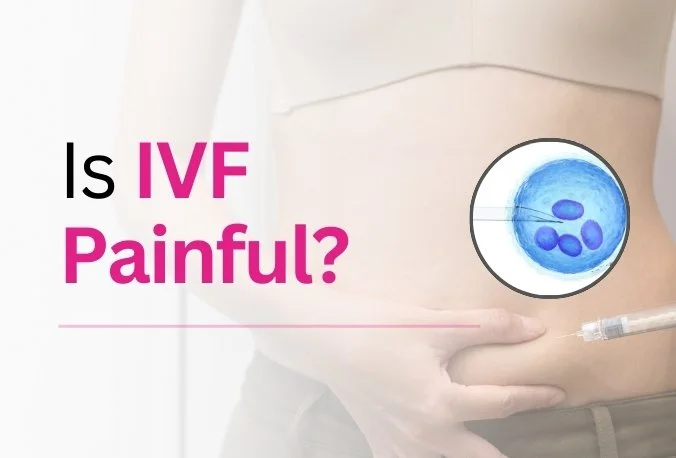is ivf painful?
– Published on 19 march 2024

In vitro fertilization (IVF) is a complex series of procedures used to help with fertility or prevent genetic problems and assist with the conception of a child. As a quintessential treatment in the field of assisted reproductive technology (ART), IVF involves the process of extracting eggs, retrieving a sperm sample, and then manually combining an egg and sperm in a laboratory dish.
The embryo(s) is then transferred to the uterus. The significance and usage of IVF have escalated globally due to rising infertility rates and advancements in reproductive technology. This article will delve into the various stages of IVF and address a common concern among prospective patients: whether the procedure entails pain.
By furnishing insights into patients’ experiences and medical expert observations, we aim to provide a comprehensive understanding of the discomfort associated with IVF.
Understanding the IVF Process
The IVF procedure is intricately structured into several key stages, each playing a vital role in the journey towards conception. Initially, the process begins with ovarian stimulation, wherein fertility medications are administered to encourage the development of multiple eggs.
This is monitored meticulously using ultrasound scans and blood tests to track the growth and development of the eggs. Subsequently, egg retrieval is performed under sedation, with a fine needle used to aspirate the eggs from the ovaries.
Following egg retrieval, experts carry out fertilization by combining the eggs with the partner’s or donor’s sperm. The fertilized eggs are then cultured in the laboratory for several days to ensure healthy embryo development.
The final step involves the delicate transfer of one or more embryos into the uterus, a pivotal moment that could potentially result in a successful pregnancy.
This scientific journey is underpinned by cutting-edge medical technology, reflecting a harmonious blend of biology and innovation. Importantly, it’s not just the physical procedures that are intensive; the emotional and psychological dimensions weigh heavily on those involved.
Anticipation, hope, and fear often accompany patients throughout the process, underscoring the need for a supportive and empathetic approach to care.
Pain Perception in IVF
Addressing the common misconception between pain and discomfort is crucial when discussing the IVF process. It is often believed that the IVF journey is painful, but it is more accurate to describe the sensations experienced as discomfort.
Pain perception varies widely among individuals, with each person having a unique threshold and response to the procedures involved. Insights from medical professionals reveal that patients frequently report a range of experiences, from mild discomfort to more pronounced sensations during various stages of the treatment.
This subjectivity highlights the importance of personalised care and the need for practitioners to listen carefully to each patient’s experiences, adapting support to meet their specific needs and concerns.
Potential Discomfort During IVF
A discussion pertaining to the physical sensations during IVF is warranted to set realistic expectations for patients. The regimen of fertility medications often necessitates routine injections, which could be a common source of discomfort due to both the act of injection and the hormonal fluctuations they induce.
In particular, these hormonal changes may lead to bloating, mood swings, and a sense of fullness or pressure. Clinics endeavor to manage and minimize discomfort through various measures such as providing detailed instruction on self-administering injections in a manner that reduces pain and using topical anesthetics to numb the injection sites.
Furthermore, personalized care plans are developed, including advice on coping strategies and alternative therapies that can alleviate discomfort. Such holistic approaches underscore the commitment of fertility clinics to not only achieve the best medical outcomes but also to ensure the patient’s comfort throughout the treatment process.
Pain Management In IVF Process
Patients undergoing IVF can benefit from a variety of pain management strategies designed to alleviate discomfort associated with treatment. Fertility clinics often offer pain relief options including over-the-counter medications, such as paracetamol or ibuprofen, which are effective for mild pain.
In some instances, stronger prescription painkillers may be considered under close supervision. Pre-emptive measures such as applying heat or cold packs, relaxation exercises, and guided imagery can also play a significant role in reducing pain.
It’s crucial for there to be clear and open communication between patients and healthcare providers regarding pain experiences and management expectations. Patients are encouraged to voice their concerns, enabling medical professionals to tailor pain relief strategies to the individual’s needs.
Addressing Concerns
Addressing Concerns
For many individuals pursuing IVF, concerns about pain can be as challenging as the physical experience itself. Clinics aim to address these common fears by providing evidence-based information that can help set realistic expectations.
Healthcare providers support patients through education and reassurance, emphasizing the transient nature of the discomfort and the availability of effective pain management options. Encouraging open dialogue ensures that concerns are heard and addressed, fostering a supportive environment throughout the journey of IVF.

By Dr Samidha Dalvi-Amale
IVF and Fertility specialist Medical Director- Pune IVF
